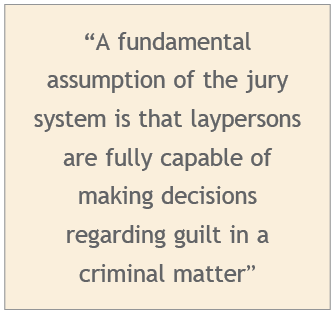 By Charlina Jean Ahn, Lee International
By Charlina Jean Ahn, Lee International
Since February 2008, pursuant to the Act on Citizen Participation in Criminal Trials, defendants in many types of criminal cases in Korea have had the right to a “citizen’s participation” trial, where a group of five to nine jurors acts as both finders of fact and rulers on the law (Article 12, section 1). In a traditional trial, a judge or group of judges makes all factual and legal decisions, in much the same way as would a judge in an American bench trial.
Under Article 1 of the Act, Korean jury trials were created to “raise democratic legitimacy” and to inspire more confidence in the judicial process as a whole. While similar to an American jury trial, a citizen’s participation trial has some striking differences. Under Article 46, the decision of a jury is non-binding. Jurors may request guidance from the presiding judge if they cannot reach a decision. Consensus is not necessarily required. Jurors may even make sentencing recommendations.
In the US, jurors act almost exclusively as finders of fact. In other words, they are responsible for determining the merits of any given material fact of a case, and ultimately whether a defendant is culpable enough to be found guilty of the charged offence(s), based on the evidence provided. Generally, they play no role in matters related to sentencing. In contrast, a judge is the arbiter of the law. The judge also controls courtroom proceedings and determines sentencing. For example, a judge decides whether an objection is sustained or overruled, and whether evidence will be admitted or excluded from consideration in a given case trial.
Historically, in common law jurisdictions, a jury trial was believed to increase fairness for the defendant based on the assumption that members of the defendant’s community, from whom a jury would be drawn, knew the defendant’s character and could therefore balance the scales of justice for a wayward defendant who was an otherwise law-abiding citizen. Of course, this could also have the opposite effect and a defendant’s reputation could work against him or her. In either case, a jury trial allowed for a more democratic process where a defendant’s fate was not tied to the opinion of a single judge.

Detractors of the jury system may argue that matters regarding the law should be determined by people who are actually trained in the law, i.e. judges and attorneys. While the sentiment is understandable, a fundamental assumption of the jury system is that laypersons are fully capable of making decisions regarding guilt in a criminal matter. In fact, using one’s moral compass and life experiences to evaluate a given scenario is something most people do on a daily basis. Expertise in the law is not a necessity; common sense and a rational mind are considered equally valuable.
If creating a more democratic process is the goal, the law should be presented to the people in a way that is clear and easy to understand because the system should be accessible to all citizens equally. If citizen’s participation trials become more widely used, defense attorneys and prosecutors alike will engage more with an audience (the jury), and over time perhaps mitigate the air of exclusivity that is oftentimes perceived by the public.
It goes without saying that having a jury system is not a guarantee that justice will prevail, or that a defendant who chooses a traditional trial is somehow less likely to receive justice. The value here lies in the defendant being able to choose between the two methods. A flawless judicial system does not and cannot exist because people create judicial systems and people are not perfect. Even with a jury’s best intentions, guilty persons may walk free and innocent defendants put behind bars, in neither case offering justice to the victim.
Although inevitably imperfect, a jury system offers democratic legitimacy to what would otherwise remain an autocratic system. This is the very reason why citizen’s participation trials were created; to build more confidence in the judicial system as it applies to criminal law. Even if an arguably more democratic process like the citizen’s participation trial yields a socially or morally undesirable result in certain cases, the merits of the system as a whole are more valuable than any single outcome.

T: 82 2 2262 6078
F: 82 2 2279 5020

